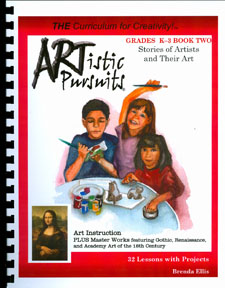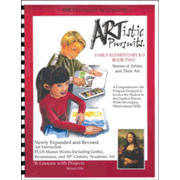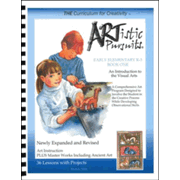Artistic Pursuitsis a series of courses that covers art appreciation, art history, artists, and skills. The emphasis on each area shifts from book to book. Throughout the lessons, students work on their own projects with various art media. While there is an underlying Christian worldview, it isn’t overtly presented until the junior and senior high level in articles about artists and the cultures of their times.
Written for students in preschool through twelfth grade, there are twelve books in the series. Designed to work in either homeschools or classrooms, the books are labeled for a range of grade levels, so you might even be able to use one course for most of your children. You can most easily use a younger-level book with older students since many skills and activities are challenging enough or offer scope for an older student to develop greater skill. For example, on page 49 of Elements of Art and Composition, Grades 4-5 Book 1, a lesson about “How to best show the subject” illustrates and discusses drawing animals at different angles. While a younger student might do a rough drawing with less detail, an older student might provide a much more detailed drawing.
All books have a plastic comb-binding so they will lie flat. This is very helpful when you are trying to follow instructions while working on an art activity. Books are printed in full color with illustrated instructions and examples of student artwork. Each book has a list of required art supplies, both at the beginning of the book and within each lesson. Students work with a variety of art media, shifting to more difficult art techniques at upper levels.
Each book should take about one school year to complete. The books for kindergarten through third grade each have 36 projects which works out to about one project per week. For grades four through twelve, there are 68 projects per book. Following are descriptions of the courses that are available.
- The Way They SEE It, for ages three to five, differs somewhat from the other books since it has more background instruction for parents to help them understand the early stages in the development of artistic perception and skills. It also teaches art appreciation and skills through a variety of projects and activities.
- An Introduction to the Visual Arts, K-3 Book 1 has three sections: What Artists Do, What Artists See, and Where We Find Art. The first section deals with observation, imagination, composition, and subject matter. The second section gets into line, color, shapes, and other elements of art as students study some works by the masters and other illustrations. The third section emphasizes art appreciation and history as students study topics such as cave art, Greek pottery, Byzantine mosaics, and medieval illumination. (This volume might fit particularly well alongside the study of ancient history, although it does touch on types of art up through the Middle Ages.)
- Stories of Artists and Their Art, K-3 Book 2 continues the art appreciation and history emphasis of Book 1, picking up in the Middle Ages and continuing into the nineteenth century. Each lesson concentrates on a particular artist and one of his or her works of art.
- Modern Painting and Sculpture, K-3 Book 3 continues to follow the historical timeline, covering from the nineteenth century to the present. Each lesson focuses on an artist or artistic movement, emphasizing positive and creative art. Children explore sculpture along with other art media.
- In Elements of Art and Composition, Grades 4-5 Book 1, art elements and principles, such as shadows, source of light, shading, texture, and balance, are taught as students develop observation and application skills.
- Color and Composition, Grades 4-6 Book 2 introduces students to color theory with an exploration of American art and artists. Students learn to work with colored pencils and watercolor pencils (with a brush).
- Although titled the same as Elements of Art and Composition, Grades 4-5 Book 1, Elements of Art and Composition, Middle School Book 1 definitely stretches students to a higher level as they work on elements and composition. For example, as they learn about balance, they also learn about asymmetry. There are some very challenging lessons such as one on how to “contain movement” within a picture and two entire units on depth. This course might be very challenging for students with little to no prior work with various media and art techniques.
- In Color and Composition, Middle School Book 2, students explore color, working with hard pastels and oil pastels. Artists and their works are from around the world.
- Elements of Art and Composition, High School, Book 1 jumps in difficulty as students apply the elements of art to learn about balance, rhythm, depth, perspective, and proportion. Most work in this course is done with drawing pencils and charcoal.
- Color and Composition, High School Book 2 teaches topics such as hue, value, balance, rhythm, intensity, and emphasis as students learn to work with various art media and study principles related to color. Watercolors are the primary media.
- Two books, Sculpture Technique, Construct and Sculpture Technique, Model are both for grades five through twelve. Students should really complete Construct before Model. The first course teaches students how to work with paper, cardboard, papier-mâché, and wire to construct their own pieces of art. In the second course, students work with putty, clay, and wool to create their own unique sculptures.
The books in this series really don’t repeat themselves even though they sometimes treat the same topics. Each level approaches an element of art at a different level and with different examples and applications. There is a real synergy that builds from book to book, so it would be ideal if you could work through the entire series.
Students are exposed to many different art media over the years. While a greater variety of media are used in the K-3 books, the upper-level books use fewer media each year but help students develop real expertise with those selected. I also appreciate that from the grades 4-5 books and up the author has students use professional art supplies most of the time rather than tempera paints, crayons, and other media often used in schools. While preschoolers through third graders do use inexpensive watercolors and tempera paints, they also learn to work with some more sophisticated media.
Even though the books are written to students, parents will need to work with students in the K-3 books, reading aloud, leading discussions, explaining the instructions, demonstrating techniques, and assisting as needed. For the grades 4-5 and grades 4-6 books, students might be able to work more independently. Even if students are able to work independently, they are likely to benefit greatly from working alongside at least one other student so that they can inspire each other and share their work.
You might also be interested in a newer series by the same author, Artistic Pursuits Text and Video Art Instruction Series.

















